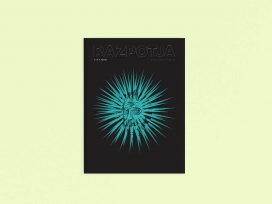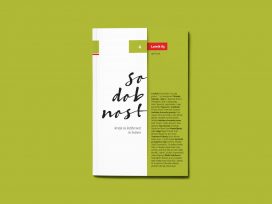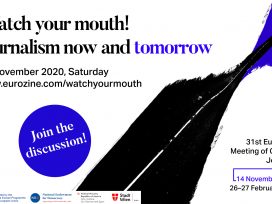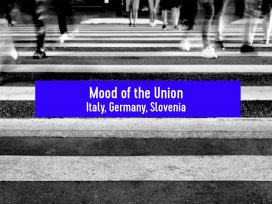“In the long run, time favors the fettered nations which, amassing forces and illusions, live in the future, in hope; but what can be hoped for in freedom – or in the regime which incarnates it, constituted of dissipation, serenity, and spinelessness? A marvel
that has nothing to offer, democracy is at once a nation’s paradise and its tomb. Life has meaning only in democracy, yet she lacks life…”
Emile Cioran
Are we Slovenes, a good decade and a half after the collapse of the totalitarian regime and the establishment of an independent nation, already approaching the situation described above by Emile Cioran? Partially so. The meagre dose of enthusiasm, the sweet revolutionary fanaticism, and the expectation of the unknown that came with the dissolution of the totalitarian system and the acquisition of independence, with its assertion of democratic standards, quickly evaporated. What has followed is the return to tastlessness, to world-weariness – Weltschmerz – garnished with a hectic nervousness in its specific, typical Slovene form.
In contrast to several other nations, the establishment of independence did not mark a special pause in the state of the spirit: we did not join the Baltic peoples in new economic vitality; the Czechs at attempts to replay the established models of a well-regulated central European “mini-country”, as we know from the Masaryk era; or the Croatians and their exclusive national self-sufficiency; let alone, that we followed the irrational grandiosity of the Serbs. The old formula of the politics of slow steps and precautions prevailed; it might have been wise, but also dangerously approaches Cioran’s analysis, quoted above. Lacking vigour and barely prepared for radical reflecting and functioning, unable to freely confront different opinions without promptly labelling and even demonizing the opposition, such a spirit manifests itself in salon debates about the same themes over and over again – themes of supposedly fundamental importance for the future of the nation. These debates often possess a sharp edge, resentment, and open hatred, yet the discourse remains mostly sterile and boring, full of cynicism without reason, mockery without wit, and buffoonery without satire. In short, empty sociological rhetoric, which, as a result of too much abstract analysis, remains flat.
Disregarding the fact that we live in a distinctly transitional and pacified period (at least from the perspective of Europe’s turbulent twentieth century history), here in Slovenia a truly opinionated puritanism rules, the dictate of informal, but nonetheless clearly determined public discourse. Its common denominator is the fight against intolerance. Former revolutionary aspirations have been replaced with fashionable cyclical patterns of social relations. One of the core commandments, despite benign temporary tensions, turns around the idea of tolerance. In defending tolerance against those who criticize its “artificial boundaries”, this discourse often uses a dramatic pathos that, despite calming the almost Biedermeier-like social dynamics, often produces an undertone of catastrophe and apocalypse.
Indeed, this all belongs to today’s world of virtual social interactions, which have little to do with real conditions and which belong to the diapason of perpetual themes such as globalization, AIDS, dictatorship and democracy, women’s rights, religious fundamentalism, tensions between North and South, ecology, and so on. These themes, true problems in themselves, serve above all as decorum for courteous academic chatting, for there is little or no true preparedness for action. Paradoxically, the fight against intolerance conceals within itself another trap, namely the posture of indifference, of political laissez faire. The essence of this type of standardized public discourse and the setting of boundaries of rhetorical acceptability propagate alienation and apathy in the sense of: “I am tolerant, therefore I tolerate ‘diversity’ (so long, of course, that it doesn’t affect my interests). However, the details don’t interest me, I don’t have any interest in getting too deeply involved in the dilemmas and needs of people. It’s more than enough to say that I’m ‘tolerant’, even through gritted teeth.”
To blame for this is the typical Slovene obsession with fate and the unwillingness to play. However playing such a game is the basic motive of parliamentary democracy and serves as the best shock absorber for societal tensions. The British example is ideal, where each polemic, despite having the appearance of overzealous antagonism, is actually a simulacrum, a bravado game between two opponents who believe in their own positions and who are prepared to defend them with the utmost decisiveness, however, who know that they are part of the show. And that is not meant pejoratively. The show in this instance is not an empty spectacle but the essence of societal activism. Here in Slovenia, this concept has been turned upside-down. Political confrontations not only give the impression of being deadly serious, they are indeed deadly serious; deviation and yielding do not – and are not allowed to – exist. Above all for reasons of prestige, the battle must be fought to the end, even if it is bitter. The most drastic result of such a principle came after the end of the Second World War and the establishment of the totalitarian regime. Such a system continues in Slovenia today – of course with completely different means – when we are constantly witness to “exceptional conditions”. Let us not waste words over the bravado of such political duels; for the most part, the rhetorical aptitude and the spiritual horizon of actors do not exceed the clichés that already became deeply embedded during the previous system.
As a rule, we Slovenes don’t know how to establish distance – either from an individual current event, or from completely banal, often contrived dilemmas. Far be it, then, that we are able to look easily and objectively upon the past or towards the future. The main reason is probably the entanglement of our local milieu with such problems, be they realistic or imaginary, and the failure of the majority to identify with the new conditions of membership of the EU, to which formal entrance was not the hard part. Hard, rather, has been the break from the self-sufficiency of former Yugoslavia, when we were connected to the global world only via the Non-Aligned Movement and its fictitious, illusionary network. During the change, we have been the victims of the long-standing indoctrination that, given our direct surroundings, our hostile neighbours could pose a threat to us. With this in mind, it is possible to draw an analogy between Slovenia and former West Berlin, also an enclave in the middle of enemy territory, with the essential difference that we Slovenes chose this type of claustrophobic isolation. While the comparison is exaggerated, the basic characteristics of today’s discourse remain identical with the most garish nonsense from the Cold War – to the west and the north, the Italians and the Austrians as historically real and contemporarily potential hegemonic powers; to the south, the Croatians, who after the last Balkan war proclaimed themselves to be the local superpower; the only exit remains to the east, via the Hungarians, however contact with the country has been reduced to a minimum.
Nothing would be essentially wrong with this type of “splendid isolation” – which by no means belongs only to large nations, and which has partially even helped us defend our national substance throughout history – if only Slovenes were a trifle more self-sufficient and infatuated with themselves, both personally and collectively. Our Balkan neighbours have provided the truly admonitory examples of how isolation and imaginary self-confidence, which rests first of all upon an irrational mythomania and idolatry of the nation (far from the erstwhile British one), can lead to grotesque consequences. However, without at least a little of this type of irrationality, Slovenia remains in an empty space. The idea of old bourgeois democracies (covered with more or less noble mould) lies within arm’s reach, but nevertheless remains – at least for now – unreachable. Likewise lost and never realized is the more elementary, wild, primary spirit of the Balkans, which, despite our formal connection to it for seventy years, has never really got under our skin.
Hence, the convulsive, often panic-stricken search for Slovene identity and national spirit. Historically, we have long built our ideal on Pan-Slavism and especially on the integration of southern Slavic nations. After some pretty bitter lessons, we again turned towards the northwest and tried once more to awaken the notion of Central Europe as a territory with a specific cultural and spiritual climate. In the end, though (and here Peter Handke is right for a change), it proved that Central Europe was just a meteorological notion. The only alternative that remained for us was the Pan-Europe programme, which, even among old members of the EU, remains, on a number of levels, an amorphous, abstract project, whose realization (or fiasco) will only be experienced by future generations. The problem of the historical mortgage from the former totalitarian regime also rears its head: namely, the politicization of the entire society, irrespective of the change (or rather expansion) of the political and ideological spectrum after independence. Politics remain the basic spiritus movens, although its omnipotent role is fictitious and virtual. At the beginning of the twenty-first century, stacking all the cards on politics and its limited range is surely not the only option.
Paternalism is coded in the Slovene mental profile. Although people’s relation to the nation is often ambivalent (and extends from glorified and uncritical rejection of the political system as such and also to the manoeuvres of individuals and parties of the political establishment), the majority still expect to be cared for and protected both physically and existentially. This position causes entrenchment in one or another political option and, paradoxically, determines that each public individual presents the main obstacle to the formation of an independent and effective civil society. The economy remains in a tense relation to politics, since it is likewise a hangover from the previous regime. The magic word in this sector is – just as it was in the socialistic system – reform. The alchemical quest for the magic formula for change in the economic system recalls old times, when something was always being “reformed” in order to create an impression of larger societal, political, and economic dynamics. The difference is that now reform really is mainly simulated. After the big political and social upheavals of the twentieth century – one after the other of which, at least from the Eurocentric standpoint, collapsed into dust – there’s evidently still room only for academic projects. This is a result of inertia and above all the battle for political prestige seasoned with thunderous polemics pro et contra.
There is also the position of the media, likewise positioned on the frontline of politics. In principle, there would be nothing wrong with this either, were it not for the ferocity with which publishing houses, editors, and journalists themselves defend the labels “pro-government” and “pro-opposition”. Such terms are commonplace in European and American journalism, yet the media feigns ignorance, probably in order to create distance from the former notion of journalists as “social-political workers”. This type of empty, merely declarative autonomy in no way serves to establish relevant and independent media reflections. Thus, readers suffer editorials that, instead of being a considered analysis of the problem, remind us of an ostentatious ego-trip. The habit of leading Japanese dailies of having as many as five journalists write the main editorial, in order to minimize subjective biases as much as possible, is for us science fiction. Slovene media – like media worldwide – has encountered a hyper-production that ultimately results in the instrumentalization of information without meaning. That is true not only of the tabloids. The tabloids have taken the initiative and most of the remaining newspapers, fearing their position, follow, intentionally or not. Such a policy neutralizes their sense, credibility, and meaning; they are adjusting to the phantom contents of the grand amphitheatre of communications.
These tendencies are far from being limited to media; we can track similar processes in the cultural sphere. There is no doubt that Slovene culture has a vital historical meaning in the construction of the nation state, from the European Revolutions of 1848 to the independence of 1991. At the same time, it is becoming clearer that the idolatrous relationship to institutionalized culture with untouchable status has finally had its day. Well known is the remark about high culture flirting with pop culture, in the hope that it would arrive at some type of golden synthesis; however, pop culture has simply swallowed up high culture. In this field, Slovenia is much more sensitive and vulnerable, since, on the basis of simple mathematical logic, it lacks the population and economic power to guarantee the existence of non-commercial or less commercial cultural contents. In some artistic fields, the situation is probably not that bad (this is especially true for certain forms of institutionalized culture, which uncritically feed off the national budget). However, a balanced approach is necessary if an open, vital and impulsive cultural scene is to be established, where self-selection is not only on the basis of market competitiveness. Otherwise, we will quickly find ourselves in the midst of a similar implosion of content and meaning as in the media field.
Perhaps Slovene culture’s biggest deficiency is authenticity. Although we have never had special blut und boden aspirations in culture or in politics, such terms often denigrate all elements in an artistic work that might reveal some sign of national character. We are of course not looking for archaic “indigenous” ethno derivations or a “turbo-folk” caricature, but for a Slovene spirit, a specific referential typicality that could be recognizable in the way that English, Russian, Serbian, Argentine cultures are recognizable.
A number of authors of course have it: Feri Lainscek or Drago Jancar, Marij Kogoj or Vlado Kreslin, Ivan Grohar or Emerik Bernard, Joze Gale or Damjan Kozole. The fear of these types of tendencies here is obviously still very present and thus often the subject of derision, because our themes as a rule must be hyper-universal and above all independent of the local milieu. Typical is an example from the theatre: when asked why, in the dramatization of a Slovene novel, all meanings and terms that had a direct bearing on the geographical location of the action (and which mostly distinguish its spiritual message and atmosphere) were cut, the director laconically served up some citations from Aristotle’s Poetics about the universality of existential questions of the individual, scornfully adding that his performance was not a tourist guide.
Of course, such opinions about the autonomy of authorial poetics are entirely legitimate. Hiding in just such patterns of thought, however, is probably the basic cause for the banning of national idioms and forced flirtation with super-national trends, a tendency not unrelated to popular culture and the aggressive marketing machine behind it. If we look at the field of visual arts, where the anti-national principle typically dictates form and also content, we can conclude that it is not a product of increase in quality and liberation from the bonds of national spirit, but a kind of crisis of production and above all a valorization of the more dominant curators who run the visual arts scene. With this comes an embarrassment: is Slovenia not really a European version of the American melting pot? In our Central European-Balkan dichotomy and amorphousness, we are lacking (with some exceptions) special ethnic traditions that we could develop and modify so that they were still usable and effective today.
If this thesis about the lack of tradition and the loss of national character holds, then it is even more paradoxical that Slovenes, despite the agony of the real and the rational, are prisoners of history, so to speak. Previous generations lived in the illusion that they “were living” history (although of course the formulation about the freezing of history in the time of communism is more or less precise). Meanwhile, current generations remain without historical references, or rather these references are manifest only as positive or negative reminiscences. This emptiness is filled with the emotional phantasms of the older generations, who are either categorically positive about recent Slovene history or traumatize it, while younger generations are either indifferent or seek refuge in retro-concepts. Such responses were once evident predominately on the field of pop culture but in the meantime have metastasized into almost all fields and experienced – as in the most famous example of Laibach and NSK – an unimagined success in foreign art institutions.
NSK is an interesting phenomenon also because of its neo-avant-garde character. The avant-garde as a rule arises – except when applied to fashion – from revolt, of which very few have happened in Slovenia: we could count serious attempts on our fingers. “The youth of the entire world were the followers of surrealism – except for Slovenes”, read the review of the first exhibition of the surrealist opus of Stane Kregar. Individuals who undertook unorthodox experiments met either hostile or compassionate reactions, for example, the constructivism of August Cernigoj in the 1920s, or the conceptualism of the OHO Group in the 1960s. Today, the neo-, retro-, or pseudo-avant-garde principle already has the smell of the academy, but who today still wrestles with such dilemmas? Culture today is an interactive playground, where visitors are invited to participate as visible equal co-authors; the entire apparatus functions more as an instrument of socialization than of reflection on existential questions. In art criticism, the border between surface pop variations and attempts at serious analysis has nearly been erased.
Irrespective of such lightness, but like in politics, Slovene culture – despite its otherwise immanent “playfulness” – does not have the status of a game. A grave tone predominates, as Iztok Mlakar would say. Slovene culture is forced to make itself up as an elegant lady but often comes out looking cheap, to put it mildly. Such a reaction is in its own way understandable, considering the aggressiveness of pop culture’s attempt to preserve exclusive status, but here Slovenes exaggerate. While it is not to be denied that we do also have some self-irony and humour, such satire is often conceited and self-destructive; our relation to society is marked by apathy, cynicism, and distance, which anyway does not have a big range.
All this lamenting is probably pointless. Despite its self-sufficiency – a trait that, regardless of its vehement resistances, it is slowly, or diligently, letting go of – Slovenia surely responds in its characteristic manner according to its historical experience and the current global trend. Such reactions are often the nuances of the universal atmosphere of today’s times; in future generations, the clinical picture of the nation will probably be completely different. After all, despite the almost proverbial inertia at these borderline critical situations, we Slovenes surprisingly uncovered the dormant mobilization factor and for a moment jumped on the train of history, which has taken us one stop further. Such as it was in the years 1848, 1918, 1941, and 1991 and maybe, for at least a part of the way, we have found ourselves on an express train. And with regard to our national mental state, which should bear the mark of its own type of tragedy, alienation and absurdity, perhaps all is not lost. The words of the painter Francis Bacon probably do hold: that true fear, tension, and dismay best reflect a greedy passion for life.






